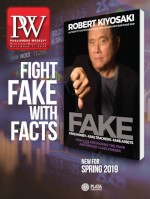In The Ruin of Kings (Tor, Feb.), a thief-turned-prince named Kihrin and his jailer take turns telling a complex epic fantasy tale.
Why did you choose to tell the story in the form of recorded conversations?
It’s actually just something that evolved. The very first drafts weren’t like that at all. It was strictly chronological, “here’s what Kihrin went through,” and I just felt it was missing something. The more I thought about it, the more I realized that that period of time while he’s waiting to be killed was where all of the interesting stuff could happen, so I changed it. And, you know, lent it to a lot of people who told me “Ooh, could you change that back?” And I ignored them.
Slavery takes many different forms throughout your world, some of which are magical. Why this theme?
The more the book evolved, the more an interesting conversation started to take place that I hadn’t really intended, and that was really a conversation about consent. So an awful lot of the book involves the various ways in which one is denied consent. From that point of view, the slavery definitely fits, but the slavery came first. And I really have to say that the main reason I had included slavery was because the nation of Quur is terrible, and I wanted Quur to be terrible from the very beginning, and I really couldn’t think of a better shorthand for how callous a nation can be than to have them give so little regard for human life.
What sort of research did you do?
I do remember doing an awful lot of research on, of all things, Amazonian foods. Because a lot of the Quuran cuisine is based off of Amazonian foods—not necessarily their cuisine, but the actual core ingredients with names changed, and things like that. There was the period of time when I was into climatology because I had to get the world map right, and there was months and months of looking into fencing, and I probably learned more about language teaching myself how to do conlangs [constructed languages] than any English teacher ever taught me, which is pretty funny.
You self-published a similar novel, The Culling Fields, in 2014. What did you change in that book to turn it into The Ruin of Kings?
Everything. Everything. The plot basically was completely redone. There was a massive change in names and in culture and just everything. So they’re completely different books at this point.



 Volume 265
Issue 49
12/03/2018
Volume 265
Issue 49
12/03/2018





